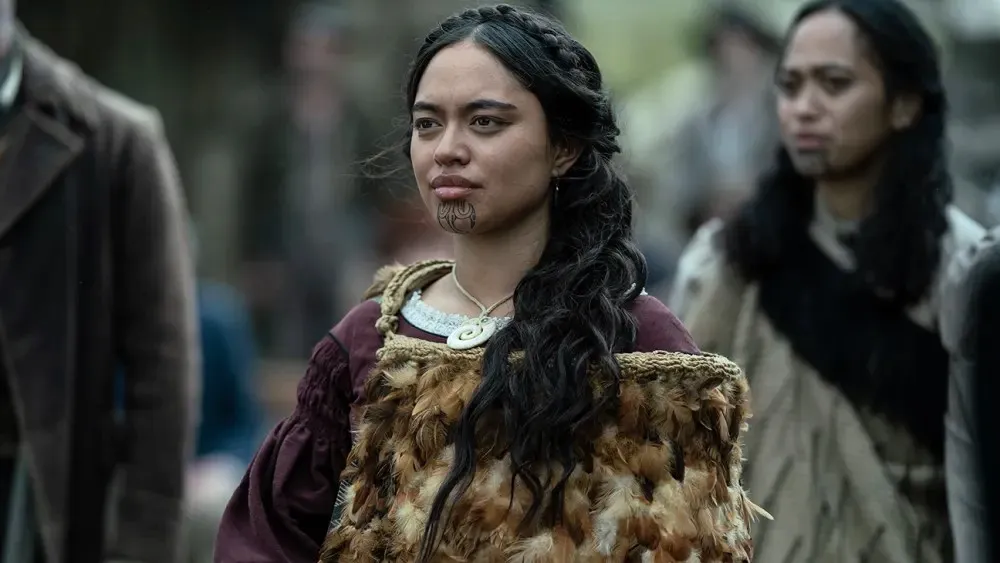
Film Review: The Convert
Film
The Convert
Director: Lee Tamahori
MBK Productions and Mister Smith Entertainment
In Theaters: 07.12
The liberal guilt period films of the ‘90s and 2000s, from Dances with Wolves and Amistad to The Last Samurai, deeply influenced me, both as a cinephile and as a person, and I retain a soft spot for them. The Convert is something of a throwback to these movies, which means dealing with the defining element that made them fall so much out of favor: the white savior trope.
The Convert is set in the 1830s, when New Zealand is still being settled by British colonists. The native Māori vastly outnumber them, but bloody wars between the indigenous tribes are taking their toll. It is in this climate that Thomas Munro (Guy Pearce, L.A. Confidential, Memento) arrives. A former British soldier haunted by the violence he committed, Munro seeks redemption by taking a position as a lay minister, a non-ordained preacher attempting to work with the indigenous peoples and elevate them through Christianity and Western civilization. When Munro stumbles into a violent conflict between tribes upon arrival, he saves the life of a woman named Rangimai (Tioreore Ngatai-Melbourne, Hunt for the Wilderpeople), though her husband is slaughtered. Munro learns that she is the daughter of Chief Maianui (Antonio Te Maioha, Spartacus: Blood and Sand), who asks the missionary to bring her back with him to the settlement of Epworth and educate her. Munro gets help from Charlotte (Jacqueline McKenzie, The Water Diviner, Malignant), one of the few white settlers who is sympathetic and compassionate to the Māori, and he gradually realizes that his grand notions of putting the violence of the past behind him and finding peace in spreading the word of God are merely a pipe dream. Munro is faced with a growing awareness that his presence here is meant as a distraction to the Māori by the British and that rather than helping the tribes, he’s being used as a pawn by both Chiefs in their escalating conflict. As a tribal war on an unprecedented scale looms, Munro grapples with questions of what his true responsibilities are, as well as the nature of his faith.
Director Lee Tamahori (Once Were Warriors, Die Another Day) has found in The Convert the closest he’s likely to ever get to a mix of the smaller, character-driven indie films based around his Māori heritage—where he first made his mark—and the larger scale Hollywood action pictures where he was never quite able to find his footing. It’s a skillfully executed mid-budget epic that’s full of impressive production value and picturesque locations. The Convert serves as an engaging glimpse at an all-too-underrepresented culture during a pivotal period in the history of a burgeoning nation. While the story is very much set up to use Munro as the point-of-view character, allowing the audience to enter the world through his eyes, it does stop short of making him the kind of larger-than-life, pre-anointed hero who is fully embraced as a chosen one to lead the people. While his journey is perhaps less overtly gripping for this fact, The Convert successfully avoids the most condescending and self-aggrandizing pitfalls of the genre. Munro remains a go-between, working with the Māori people rather than ever reaching a clear position of leadership. While this is refreshing and laudable, the attempt to not let the white character reach full savior status doesn’t quite succeed in putting the Māori at the center of the story. It’s a white observer/ally story, as Munro is ultimately the one who is converted.
Pearce, a talented actor whose small number of truly great films are still striking enough to forgive the many terrible ones that followed, gives his strongest lead performance in over a decade, and brings a thoughtful and introspective quality to Munro that makes him a likable and engaging character. Ngatai-Melbourne is outstanding as Rangimai, the true heart of the story. McKenzie is captivating in a somewhat underwritten role, though she brings enough power and tenacity to make her character shine.
The Convert is a smart and heartfelt period piece focusing on a lesser-known time and place, and it earns a recommendation, especially if you like historical films. While Tamahori’s film isn’t quite a must-see event, it’s an intriguing work with lofty ambitions, and it’s shrewd enough not to try to give answers to all of the questions that it asks. –Patrick Gibbs
Read more historical film reviews here:
Film Review: Fly Me to the Moon
Film Review: Wicked Little Letters